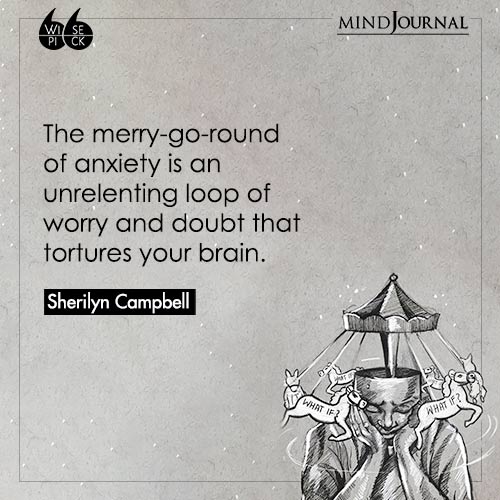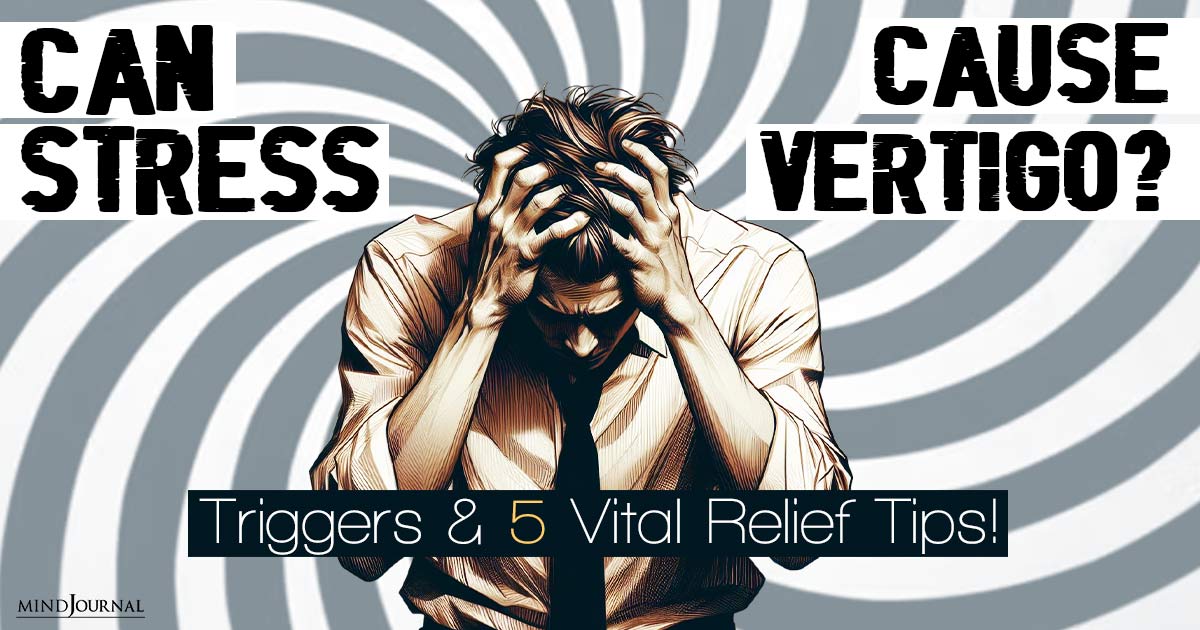We all deal with stress, but did you know it can do more than just mess with your mood? It can even make you feel dizzy and can even disorient you!
Vertigo isn’t just a simple dizziness; it’s a disorder that messes with our balance. It creates a feeling of movement even when none is happening. People with vertigo often describe it as feeling like the world is spinning around them.
Now, imagine dealing with the usual stress on top of that!
In this article, we’ll dig into how can stress cause vertigo and explore simple ways to find relief. Whether it’s quick tips for immediate relief or strategies for handling stress in the long run, we’re here to help you regain your balance, even when life feels like a constant spin.
So join us as we explore the triggers of vertigo and what you can try for quick relief!
Link Between Stress And Vertigo
Vertigo is intricately connected to the sense of balance which is characterized by a disorienting sensation of movement. Two main components regulate our sense of balance: the inner ear and the brain’s balance center.
The presence of three fluid-filled canals and specialized hair cells in the inner ear plays a crucial role in detecting movement and transmitting messages to the brain’s balance center.

Common causes of vertigo often involve inflammation or disorders in the inner ear that results in mixed signals being sent to the brain thus causing vertigo.
Moreover, stress-related physical symptoms may expose an individual to even greater chances of developing vertigo. Tightening of muscles in the neck, back, and shoulders linked with stress can result in headaches and migraines.
However, it is not just physical disruptions within the inner ear that connect stress with vertigo. High levels of cortisol or other stress hormones can interfere with how neural information from vestibular systems reaches this part of the brain.
It is vital to understand how can stress cause vertigo to navigate through the relationship between stress and vertigo and develop relief strategies as well as long-term management options.
Read More: What Are Stress Dreams? 10+ Powerful Dreams Interpretations
How Can Stress Cause Vertigo?
While a short surge of anxiety can be useful when we are in danger, chronic stress tells another story.
To understand how can stress cause vertigo? We have to look at the effects of stress on the nervous system!

When people have been under prolonged stress, there is a disruption of the normal hormone message flow. This can happen through repeated exposure to ongoing stressors or in conditions like anxiety disorders.
However, the same hormones that are produced when you are stressed or anxious about something else can also rise. Then they interfere with how nerve cells function and with the inner ear, causing that nauseous sensation of vertigo to some individuals.
It is important to note that people who have anxiety often experience chronic dizziness. Additionally, crowded places with many things happening at once can make this type of dizziness worse.
Thus, it is not always only about health issues that result in feelings of vertigo. It means that dizziness can be brought about by a series of external stressors!
So what specifically causes vertigo?
Read More: What Is Box Breathing Technique: 4 Steps To Stress Reduction
Identifying Vertigo Triggers
Numerous things can trigger vertigo which may significantly change the way you live. These triggers must be explored to help manage and prevent episodes of vertigo.
Let’s have a look at these vertigo triggers:
1. Positional Changes
These usually occur as a result of specific head movements or altering body positions and can lead to sudden and severe bouts of vertigo which are particularly common when doing things like rolling over while lying in bed.
2. Inner Ear Issues
The inner ear disorders causing viral and bacterial infections resulting in inflammation in the inner ear, known as labyrinthitis, is one such powerful trigger for your bouts with vertigo.

Meniere’s disease is a chronic inner ear condition characterized by recurring attacks of dizziness or fainting accompanied by hearing loss and ringing in the ears.
3. Medications
Certain medications, particularly those that affect the inner ear or central nervous system, may cause some patients to experience bouts of dizziness as a side effect. It is important to take note of drug-induced factors that might help you effectively manage your vertigo.
Read More: Are Medications The Only Solution To Mental Illness?
4. Stress and Anxiety
Modern life characterizes excessive stress which may disrupt hormone balance thus making your inner ears vulnerable leading to vertigo triggers!
Conditions like generalized anxiety disorder or panic disorders may heighten the likelihood of you experiencing vertigo, emphasizing the interconnected nature of your mental and physical well-being.
Vertigo due to multiple sclerosis or certain seizure disorders can be traced back to neurological issues affecting your nervous system. You should therefore understand that managing this condition requires you to focus on neurology together with dealing with instances where you face dizziness.
Read More: Your Biggest Anxiety Triggers: What Gets 12 Signs Stressed
How Anxiety Causes Vertigo
When you’re feeling anxious all the time, it messes with your body’s balance system. A study in 2016 looked at 7,750 people with anxiety and the same number without it.

After 9 years, they found that those with anxiety were 2.17 times more likely to get a type of dizziness called benign paroxysmal positional vertigo (BPPV) compared to those without anxiety.
Sometimes, anxiety can make you suddenly dizzy, especially when you face things that make you nervous. For example, if you’re scared in big crowds, you might feel dizzy in a crowded room. Or if you’re a nervous driver, traffic might make the world seem like it’s spinning.
But it goes both ways. Feeling dizzy and worrying about it can also make you anxious. So, it’s like a loop where anxiety and dizziness feed off each other.
Tips For Relief From Stress-Induced Vertigo
If you have stress-induced vertigo, here are some tips that might help relieve the symptoms and provide comfort:
1. Breathing Deeply
Take slow deep breaths to relax your nerves. Take a deep breath in through your nose, hold it for a few seconds, and release it slowly through your mouth. It can lower anxiety and increase blood flow of oxygen to your brain.
2. Practicing Mindfulness and Meditation
Adopt mindfulness or meditation approaches to help you relax and reduce stress. Concentrate on your breathing and attempt to dismiss worrisome ideas.
3. Remaining Hydrated
Drink enough water all through the day since dehydration can lead to dizziness.
4. Getting Enough Sleep
Insufficient sleep intensifies stress along with vertigo symptoms. Work towards seven to nine hours of good quality sleep every night.
Read More: 8 Surprising Health Benefits Of Sleeping On Your Left Side
5. Know Your Triggers
Be aware of specific circumstances or activities which cause you stress as well as vertigo. Once identified, it will be possible to manage or avoid such incidents.
6. Avoid Stimulants
Minimize the amount of stimulants such as caffeine and nicotine in your diet because they may increase anxiety levels in addition to precipitating attacks of vertigo.
It is always important that you consult with a medical professional before making any major changes in your lifestyle or starting any new treatments.
If you experience prolonged stress-related episodes of vertigo that become worse, it is necessary to get a complete evaluation from a healthcare provider and institute appropriate therapy.
How To Cure Vertigo Permanently
To cure vertigo permanently, you must know the root cause. It is very important to have a sound health professional who will do an in-depth evaluation and provide an accurate diagnosis.
It is important to know how can stress cause vertigo as the kind of vertigo you have determines what treatment is best for you.
Some common ways of doing this include:
1. Vestibular Rehabilitation
This is an example of physical therapy which concentrates on exercises that improve balance and reduce dizziness. A physical therapist who has been trained on it would then create a program based on the symptoms that you have personally.
2. Canalith Repositioning Maneuvers
In some cases, certain movements can be made to put back displaced crystals in the inner ear and alleviate problems related to BPPV (Benign Paroxysmal Positional Vertigo) and other forms of vertigo.
3. Medication
Depending on the cause of vertigo, medications may be prescribed to alleviate symptoms or address an underlying condition. These may include anti-vertigo medications, anti-nausea drugs, or medications to treat underlying medical conditions.
4. Lifestyle and Dietary Changes

Making certain lifestyle changes like reducing salt intake, maintaining hydration as well as avoiding some triggers can help with the management of vertigo symptoms.
Read More: Dietary Changes Are Proven To Effectively Treat Major Depression
5. Treatment of Underlying Conditions
If vertigo is just a symptom resulting from another medical problem like migraines or Meniere’s disease, treating the primary condition can relieve it too.
6. Surgery
Surgery is also considered in some cases especially if there are structural problems involving your ear or vestibular system which are producing vertigo.
However, it should be noted that all cases of vertigo cannot always be cured completely. Some people might require long-term care and adjustments in their way of life to manage their symptoms continuously. Lastly, treatment effectiveness may vary among different individuals.
Regaining Balance
As we wrap up our discussion on the relationship between stress and vertigo, the key takeaway is this: understanding how can stress cause vertigo is crucial for finding lasting relief.
Life can throw us off balance, but armed with knowledge and proactive strategies, we can navigate the twists and turns. Whether it’s through mindfulness, identifying triggers, or seeking professional advice, regaining balance is not just a wish—it’s a real possibility.
Remember, it’s not just about the physical sensations but the connection between our mental and physical well-being!
Frequently Asked Questions (FAQs)
1. How Can stress cause vertigo?
Yes, chronic stress disrupts hormonal balance, affecting the inner ear and nerve cells, leading to vertigo.
2. What is the link between stress and vertigo?
Elevated stress levels, especially cortisol, disrupt information transmission from the vestibular system to the brain, increasing susceptibility to inner ear disturbances and vertigo.
3. What are some vertigo triggers?
Triggers include positional changes, inner ear issues, certain medications, stress, and underlying neurological conditions. Identifying these is vital for managing vertigo.
4. How anxiety causes vertigo?
Chronic anxiety elevates stress hormones, impacting the vestibular system and inducing muscle tension, contributing to dizziness. Studies show a link between anxiety disorders and specific vertigo types.
5. How to cure vertigo permanently?
Curing depends on the cause. Options include vestibular rehabilitation, maneuvers, medication, lifestyle changes, and surgery. Personalized management is key, and professional advice is crucial for effective, individualized treatment.










Leave a Reply